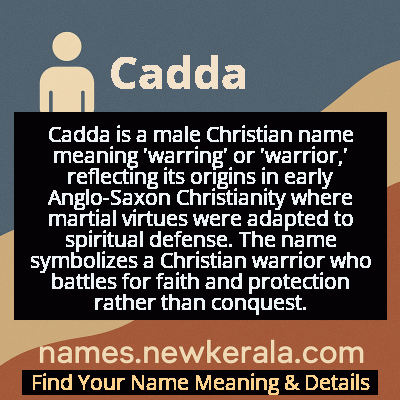Cadda Name Meaning & Details
Origin, Popularity, Numerology Analysis & Name Meaning of Cadda
Discover the origin, meaning, and cultural significance of the name CADDA. Delve into its historical roots and explore the lasting impact it has had on communities and traditions.
Name
Cadda
Gender
Male
Origin
Christian
Lucky Number
4
Meaning of the Name - Cadda
Cadda is a male Christian name meaning 'warring' or 'warrior,' reflecting its origins in early Anglo-Saxon Christianity where martial virtues were adapted to spiritual defense. The name symbolizes a Christian warrior who battles for faith and protection rather than conquest.
Cadda - Complete Numerology Analysis
Your Numerology Number
Based on Pythagorean Numerology System
Ruling Planet
Uranus (Rahu)
Positive Nature
Strong sense of order, loyal, practical, and disciplined.
Negative Traits
Stubborn, overly serious, rigid, and prone to feeling restricted.
Lucky Colours
Blue, gray.
Lucky Days
Saturday.
Lucky Stones
Blue sapphire.
Harmony Numbers
1, 7, 8.
Best Suited Professions
Managers, engineers, accountants, organizers.
What People Like About You
Dependability, discipline, practicality.
Famous People Named Cadda
Saint Cadda
Christian missionary and bishop
Early Christian missionary to the Anglo-Saxons, founded churches in Mercia
Cadda of Lindsey
Anglo-Saxon nobleman
Prominent noble in the Kingdom of Lindsey, mentioned in historical chronicles
Cadda the Thegn
Military leader
Military commander under King Offa of Mercia, known for battlefield successes
Name Variations & International Equivalents
Click on blue names to explore their detailed meanings. Gray names with will be available soon.
Cultural & Historical Significance
The name's Christian significance is particularly notable as it represents the transformation of pagan warrior ideals into Christian service. Early Christian missionaries often adopted or were given names that reflected their previous roles, symbolizing how their martial skills were now dedicated to spiritual warfare. Cadda thus embodies the historical moment when Anglo-Saxon society was undergoing profound religious and cultural change, making it a name that captures both the old warrior ethos and the new Christian worldview that was reshaping England.
Extended Personality Analysis
Individuals named Cadda typically exhibit strong leadership qualities combined with strategic thinking and determination. They often possess a warrior spirit that manifests as resilience in facing challenges and protecting those under their care. This name suggests someone who is principled yet practical, able to navigate complex situations with both courage and wisdom. Their inherent 'warring' nature doesn't necessarily indicate aggression, but rather a persistent drive to overcome obstacles and defend their beliefs.
Caddas are often seen as natural protectors who combine strength with compassion, making them effective in roles requiring both firmness and empathy. They tend to be loyal to their causes and communities, with a deep sense of responsibility that guides their actions. The Christian association adds a layer of moral conviction and spiritual depth to their character, often making them advocates for justice and defenders of the vulnerable. While they can be formidable when challenged, they typically exercise restraint and seek peaceful resolutions first, reserving their combativeness for situations where principles are at stake or protection is needed.
Modern Usage & Popularity
In contemporary times, Cadda is an extremely rare given name, primarily found in historical reenactment communities, among families with strong Anglo-Saxon heritage, or in academic circles studying early medieval history. The name has never appeared in modern popularity charts and remains obscure outside specialized contexts. However, there has been minor renewed interest in ancient Anglo-Saxon names among parents seeking unique, historically significant names. The simplified variant 'Cade' has gained some popularity, while 'Cadda' itself maintains its status as a historical curiosity rather than a mainstream choice. Its usage today is almost exclusively as a middle name or in contexts where historical authenticity is valued, such as in certain traditional Christian communities that emphasize early English Christian heritage.
Symbolic & Spiritual Meanings
Symbolically, Cadda represents the warrior-protector archetype transformed through Christian values. The name embodies the concept of spiritual warfare - battling against moral and ethical challenges rather than physical enemies. It symbolizes the integration of strength and faith, where martial qualities are redirected toward defending spiritual principles and community welfare. The name carries connotations of transformation, representing how raw power can be channeled into constructive leadership and protective stewardship. In metaphorical terms, Cadda signifies the journey from physical combatant to spiritual guardian, maintaining vigilance and courage while serving higher purposes. This symbolic meaning makes the name particularly resonant in contexts where strength must be balanced with compassion and where protection extends beyond the physical to include moral and spiritual safeguarding.

